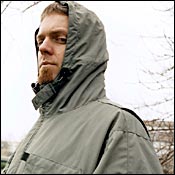
Thanks to rhythmic thieves like P. Diddy and the hordes of wannabe heirs to Duchamp (as with the recent “Mirroring Evil” exhibition), making art out of found objects has rarely seemed less credible. Yet that hasn’t dissuaded California-based DJ Shadow, who has brought a missionary zeal to the art of assemblage since his 1996 debut, Endtroducing … On that album, he stitched together bits of spoken word, jazz, even commercials into a dreamy, cocoonlike world, an ethos meant to reclaim the emotional potential of found sounds (the cover depicted shoppers combing through a record store).
Shadow’s new album, The Private Press, takes the same art-out-of-recovered-records approach, but as its title suggests, it’s more personal (it’s bookended by samples of an anonymous woman’s recorded letters to home) than Endtroducing … It’s also less rootsy than its predecessor, as Shadow moves from the bohemian, jazzy hip-hop he’s come to be associated with to more synthetic sounds like electro and synth pop. This is a welcome change, as Shadow’s sometimes overly atmospheric sound – and the multitude of innovators it inspired on labels like Mo’ Wax – had begun to dissolve into trip-hop torpor by the end of the nineties.
Shadow is less patient with meandering statements on The Private Press: In one song, “Un Autre Introduction,” he transposes a baby’s cry, drilling tom-toms, and the cartoonish bark of a French M.C. in just 44 seconds, and in another (“Walkie Talkie”), he maniacally splices together growling, hurdy-gurdy bass lines, strafing, technolike effects, and joyous old-school samples (“I walk and talk this way!”) with an auteurship reminiscent of early Grandmaster Flash.
The more ambitious songs on The Private Press – like “Giving Up the Ghost” – seem both more meaningful and more weightless thanks to a newly quick-witted sensibility that glides among samples of rhapsodic violins, roiling pianos, and beats hammered out with a texture that is usually reserved for audiophile musical forms like jazz and techno.
Only on “Blood on the Motorway,” a ballad where a vocalist whose whining voice and clichéd lyrics (“You have not betrayed your ideals / your ideals betrayed you”) are reminiscent of Michael Stipe at his wispy, wimpy worst, does Shadow fall prey to his outsize ambitions. Thankfully, that dull tune is followed by “You Can’t Go Home Again,” a wonderfully loose riff on ska and synth pop that proves Shadow’s home is in the mongrelized future, not in his portentous past.
Eminem has become famous for bringing all manner of uncomfortable subject matter – obsessed fans, domestic violence, hallucinogenic drugs – to the fore of the increasingly conservative world of hip-hop. But the rapturous reception that greets his work from music critics and the public is more indicative of the near-total failure of contemporary hip-hop to present compelling stories than of his success in addressing such seemingly untouchable stuff.
The from-the-grave conclusion of “Stan” is a hackneyed storytelling device, and Eminem’s countless ruminations on his homicidal intentions toward wife Kim reveal little more than horror-movie revenge schemes (none come close to Wu-Tang Clan leader RZA’s truly disturbing song “Domestic Violence”).
So it’s exciting to hear the rapper begin his new album, The Eminem Show, with unexpectedly smart, piercing observations on the spoils his skin color has brought him (“Look at my sales / Let’s do the math, If I was black I would’ve sold half”). But the album’s promise soon gives way to the familiar uninspired ugliness about his mother (“Cleaning Out My Closet”) and wife ("The Kiss”) as well as dunderheaded boasts about his gun fetish ("Soldier”).
It’s all wrapped in an Osbournes-era conceit that Eminem’s audience is getting unfettered insight into his persona (the CD booklet even features surveillance-style photos of Eminem doing everything from picking up his mail to playing with daughter Hailie in the pool). But unlike the fascinatingly fucked-up Osbournes, Eminem evades self-examination by slinging mud at his enemies, preening at his own power, and offering sentimental odes to his lost childhood. The Eminem Show has pretensions toward real life, but it possesses all the resonance and revelation of a sitcom.
DJ Shadow
The Private Press (MCA)
Eminem
The Eminem Show (Aftermath)